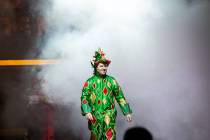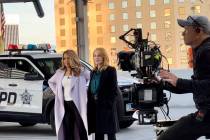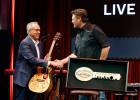“When Did You Last See Your Father?”
Summertime ... and the movies are silly.
Some are good ("Indiana Jones," anyone?) and some are bad (take un-"Wanted" -- please!).
But very few movies that turn up during this superheated season achieve the intelligence and emotional impact of "When Did You Last See Your Father?"
Naturally, it's British, with all the tidy, sit-straight, stiff-upper-lip control those origins imply.
Yet its focus on a grown man struggling to come to terms with his father's death -- and, more importantly, his life -- will resonate with anyone who's tried to reconcile the conflicting emotions that mark a relationship with a beloved but exasperating parent.
All of which means "When Did You Last See Your Father?" should resonate with virtually everyone.
Everyone, that is, who doesn't mind burrowing into that treacherous territory where the truth stings. Including the rueful but inescapable truth that loving someone doesn't always mean liking them, or what they do.
What's true, however, is also potentially trite. Unless, of course, you have two actors as splendid as Jim Broadbent and Colin Firth embodying opposite sides of the father-son divide.
Based on British writer Blake Morrison's nonfiction best-seller, "When Did You Last See Your Father?" explores the rocky emotional landscape the successful author must traverse when he learns his father has terminal cancer.
Facing that would be enough of a challenge for any father-and-son duo. Because Blake (played, as an adult, by Firth) and his father, Arthur (Broadbent), have such a prickly, complicated relationship, however, Blake must come to grips with various memories and emotions before he truly can bid his father a farewell that's loving, if not altogether fond.
How could it be, when Blake knows his father so well?
A blustery, sometimes boorish bear of a man, Arthur may be a successful Yorkshire doctor, married to another physician (the ever-resourceful Juliet Stevenson) who's learned to live with his neediness and self-centered self-indulgence. Including his sometimes very public infidelities.
Blake, however, has never quite reconciled himself to his father's many weaknesses, revealed during a lifetime of confrontations. At the same time, he can't help but recall the delights as well as the disappointments of life with father.
They may not balance out, but they certainly present a challenge to Blake as he measures his memories and struggles to put the resulting emotions in perspective.
As "When Did You Last See Your Father?" asserts, it's an impossible but inescapable task. For Blake, that is.
For screenwriter David Nicholls and director Anand Tucker, however, it's familiar terrain. Nicholls is a novelist as well as a screenwriter (he adapted his own semiautobiographical "Starter for 10" for the screen) and Tucker ("Shopgirl") focused on sisterly conflicts in the haunting, daunting "Hilary and Jackie."
Together, they transform an inherently nondramatic premise -- rummaging around in a grown man's memories -- through seamless use of flashbacks and flash-forwards, flowing from distant past to painful present and everywhere in between.
Perhaps to compensate for the story's lack of linear dramatic structure, Tucker occasionally overdoes the showy, plays-with-camera visuals -- especially through repetitive, ultimately predictable mirror shots that signal how Blake's reflecting on his life, and his father's.
Yes, Mr. Tucker, we get it -- and we don't need such literal reminders. Especially not with the dream team of Broadbent and Firth on the job.
Total opposites in terms of style -- Broadbent eager and expansive, Firth subtle and understated -- the two actors share relatively few scenes. And in most of those, Broadbent's character is bedridden and bewildered at best.
Consequently, it's up to Blake's younger incarnations -- Bradley Johnson as a wide-eyed 8-year-old and especially Matthew Beard as a bookish, resentful teen -- to bridge the gaps between then and now.
Through each boy's exchanges with his father, we come to understand how Arthur's irresistible vitality can light up a room -- or suck the air from it. (Sometimes both at the same time.)
Yet Broadbent goes far beyond surface bluster to capture the deeply buried, but undeniable, desperation of a man so unsure of his worth he keeps trying to prove it to himself, even if that means hurting and alienating his loved ones in the process.
Firth, meanwhile, resists the temptation to play the wounded victim. (The movie's much the better for it.) He artfully delves beneath Blake's surface nobility to expose the self-righteous anger, the childish resentment, the half-buried guilt and the inescapable affection that -- no matter how strenuously he tries to deny it -- have helped to make him the man he is today.
And in more ways than he cares to admit, Blake takes after his father.
Watching "When Did You Last See Your Father?" -- and watching him come to terms with this inescapable truth -- makes for a poignant foray into the deeper reaches of the heart.
Contact movie critic Carol Cling at ccling@reviewjournal.com or 702-383-0272.
MOVIE REVIEW movie: "When Did You Last See Your Father?" running time: 92 minutes rating: PG-13; sexual content, mature themes, brief profanity verdict: B now playing: Suncoast DEJA VIEW The ties that bind fathers and sons -- and the conflicts that drive them apart -- inspire these very different family portraits: "Hud" (1963) -- A rebellious Texas hell-raiser (Paul Newman) clashes with his old-fashioned rancher father (Melvyn Douglas) in this Oscar-winning modern-day Western. "A Bronx Tale" (1993) -- In 1960s New York, a devoted bus driver (Robert De Niro) battles a neighborhood mobster (Chazz Palminteri) for the heart of his son (Lillo Brancato). "Big Fish" (2003) -- A grown son (Billy Crudup) tries to discover the truth behind the outlandish tales his dying father (Albert Finney) spins in director Tim Burton's fanciful fable co-starring Ewan McGregor and Jessica Lange. "The Squid and the Whale" (2005) -- Brothers (Jesse Eisenberg, Owen Kline) struggle to deal with the breakup of their self-centered parents (Jeff Daniels, Laura Linney). "The Namesake" (2006) -- The American-born son (Kal Penn) of Indian immigrants rejects the traditions of his devoted father (Irfan Khan) in director Mira Nair's adaptation of Jhumpa Lahiri's novel. -- By CAROL CLING




























